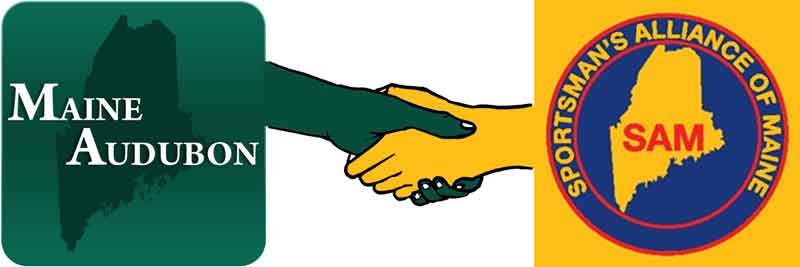Environmentalists and sportsmen share many goals and are the state’s strongest coalition when they get together.
A few weeks ago, I joined Ted Koffman, executive director of Maine Audubon, at a meeting of a coalition of land trusts organized by Maine Coast Heritage Trust. We described the long partnership between Audubon and the Sportsman’s Alliance of Maine, where I served as the executive director for 18 years.
The collaboration between these two groups began in the 1990s, when Christian Potholm, the state’s top pollster and political strategist, convinced us that we could win almost any issue when we brought our respective constituencies together.
Our first partnership achieved a spectacular result, creating the Maine Outdoor Heritage Fund, which has provided more than $14 million for outdoor recreation and wildlife habitat projects, many of which would not have happened without Fund grants.
The focus of the partnership between Audubon and SAM was on the Legislature, where we enjoyed much success, focusing on areas of mutual concern such as protection and enhancement of wildlife habitat.
And it was no accident that campaigns to win bond issues for the Land for Maine’s Future program featured Audubon and SAM working together.
This is not to minimize the work of other groups representing sportsmen and environmentalists.
The Maine Professional Guides Association and The Nature Conservancy, for example, have been strong players at the State House, and we all worked together on many issues. The relationship between Maine Audubon and SAM, however, has been particularly close.
Each year before the legislative session started, I would meet with Audubon’s staff to review our respective legislative agendas, looking for issues on which we could work together, and identifying issues where we differed, while attempting to minimize our differences.
I came to this partnership knowing that sportsmen are environmentalists. We enjoy everything there is to enjoy outdoors in Maine. We value every critter in the woods, not just those we hunt with firearms and bows.
The folks at the land trust meeting asked Ted and I to identify the lessons the two organizations have learned from their partnership. There are many.
We learned that we can’t always win, but we always lose when we are divided. Our greatest disappointment continues to be our inability to win public support and funding for Maine’s beleaguered Department of Inland Fisheries and Wildlife.
We came to realize that we cannot let the negative members of our respective constituencies (and members) dictate our relationship or future.
SAM has members who consider Maine Audubon to be the enemy, and vice versa. In fact, that was my point of view for many years. As a member of SAM’s Board of Directors in the late 1970s and early 1980s, it was drummed into me that environmental groups were our enemies. It took me quite a while to discover that this is not true, and need not be true in the future if we realize how much we have in common and work to build positive relationships between our organizations and our members.
I also have changed my mind about the future of sportsmen on private land. While we revere Maine’s tradition of unfettered access to private land for public recreation, it’s being lost at an alarming rate. For many reasons, millions of private acres are now posted. This makes public lands and conservation lands very important, especially for hunters, if we are to have places to hunt in the future. I’m not saying we’ll get to the point where we can’t hunt on any private land, just that public land will be at least as important as private land to future hunters.
The collaboration between sportsmen and environmentalists seems to be spreading, too. I noted that land trust representatives are anxious to work with local hunting and fishing clubs on outdoor kids programs. We all know that kids who get outdoors today will be our conservation leaders tomorrow.
The level of understanding that land trust property can be a real asset to our outdoor economy — which needs a lot of help right now — also pleased me. Making these properties available for birding, hiking, and yes, even hunting, and advertising those opportunities, can make a real difference for those whose businesses depend on outdoor enthusiasts, including tourists.
We all love and share Maine’s great outdoors — and must act together to protect and sustain it.
George Smith is a writer and TV talk show host. He can be reached at 34 Blake Hill Road, Mount Vernon 04352, or georgesmith maine@gmail.com. Read more of Smith’s writings at www.georgesmithmaine.com.
Send questions/comments to the editors.



Success. Please wait for the page to reload. If the page does not reload within 5 seconds, please refresh the page.
Enter your email and password to access comments.
Hi, to comment on stories you must . This profile is in addition to your subscription and website login.
Already have a commenting profile? .
Invalid username/password.
Please check your email to confirm and complete your registration.
Only subscribers are eligible to post comments. Please subscribe or login first for digital access. Here’s why.
Use the form below to reset your password. When you've submitted your account email, we will send an email with a reset code.